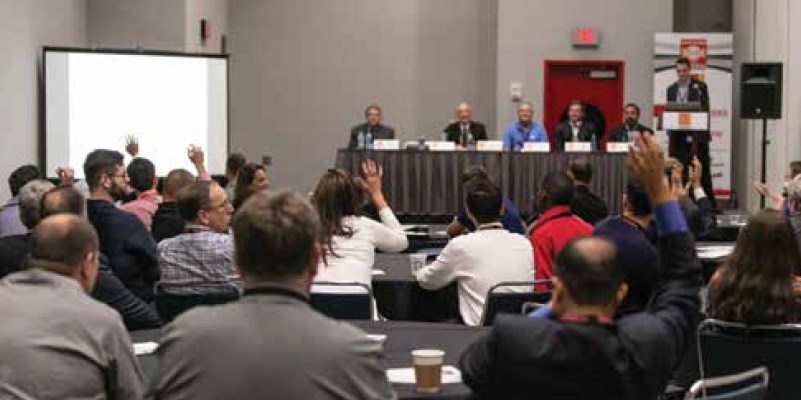Working with Valves
Voelker has worked with many types of valves throughout his career – gate, globe, check, pipeline, marine, emergency shutoff, and the like. Gate valves are generally used for isolation. Isolation, or shut-off, valves completely stop fluid flow when closed or, in the fully open position, allow max flow in a pipeline. This valve consists mainly of a body, seat and disc, a stem, gland, and a handwheel for operating the valve. Globe valves are primarily designed to regulate flow in a partially open position, while gate valves in contrast are designed to be in a fully open or closed position. Check valves are self acting, depending on system pressure and, in some cases, springs to achieve an effective seal. “Emergency shut-off check valves are essentially swing check valves that stay open during normal operation and have a fusible link that melts at a specific given temperature, typically 165 degrees Fahrenheit or 212 degrees Fahrenheit. When that fusible link melts, the valve will close,” said Voelker. As the close operation is self acting, just like a standard check valve, it would remain in the open position until the event of a fire. Each of these valves is subject to related fugitive emission testing and standards under API.
Fugitive Emission Testing
Fugitive emission tests for valves are used to evaluate the integrity of the stem seals and body joints of isolation and control valves that are intended for applications where hydrocarbons and hazardous fluids exist. All valve manufacturers whose products conform to the downstream API specifications must use an API 622 compliant packing and subject the design to the applicable fugitive emission type test. “All packing sets are tested and qualified per API 622,” said Voelker. “API, unlike ISO, requires qualification of the packing independently then the complete assembly, valve and packing, is tested. The applicable valve test is dependent on how the valve functions, API 624 for rising stem designs utilizing graphite packing or API 641 for quarter turn designs with varying stem seals. There are also designs not governed by the refining sector of API, such as pipelines valves designed to API 6D used in the midstream market where there are no mandatory emissions requirement in the design specification, so the testing for that particular valve would vary from manufacturer to manufacturer.”
It is part of Voelker’s primary responsibilities to remain informed and up to date on any valve regulation updates, hence his active participation on standard committees such as API and MSS. An example of a significant change can be found in the recently published new edition of API 623. According to the scope, this API standard specifies the requirements for a heavy-duty series of bolted bonnet steel globe valves for petroleum refining and similar applications.
Importance of Networking
In the valve industry, everyone knows everyone. Attending industry events like Valve World Americas Expo & Conference is important as it brings all sectors of the valve industry together, in a non-competitive, casual, and learning-oriented environment. “I have been attending Valve World Americas since I entered the industry. As ours is a close-knit world, I like to take advantage of every networking opportunity I have, to have discussions with people I do not routinely run into. I think it is a huge benefit,” said Voelker.
Voelker transitioned from simply participating and networking, to offering lectures and speeches, and progressed into working on the steering committee for the event throughout his career. “What you gain from these events is knowledge and personal connections. It is a great opportunity for people in the industry, of all experience levels, to share valuable information, and have conversations with experts. The people giving presentations are often readily available throughout the conference, walking around, and are happy to be approached.”


